Psychology in Health and Social Care: Factors and Roles, PSY101 Report
VerifiedAdded on 2023/01/19
|7
|1856
|90
Report
AI Summary
This report delves into the realm of psychology as it applies to health and social care, providing a comprehensive understanding of the subject matter. It begins with an introduction that outlines the relevance of psychology in analyzing human behavior and its various determinants within health and social care contexts. The report covers the explanation of social and biological factors influencing human behavior, highlighting the impact of genetics, neurological structures, culture, and education. It also includes an analysis of the importance of social roles within health and social care settings, emphasizing how social norms and roles affect patient behavior, compliance with treatments, and relationships with caregivers. The report concludes by summarizing the key findings and underscoring the significance of psychological theories in managing stress, behavioral disturbances, and mental health disorders within health and social care environments.
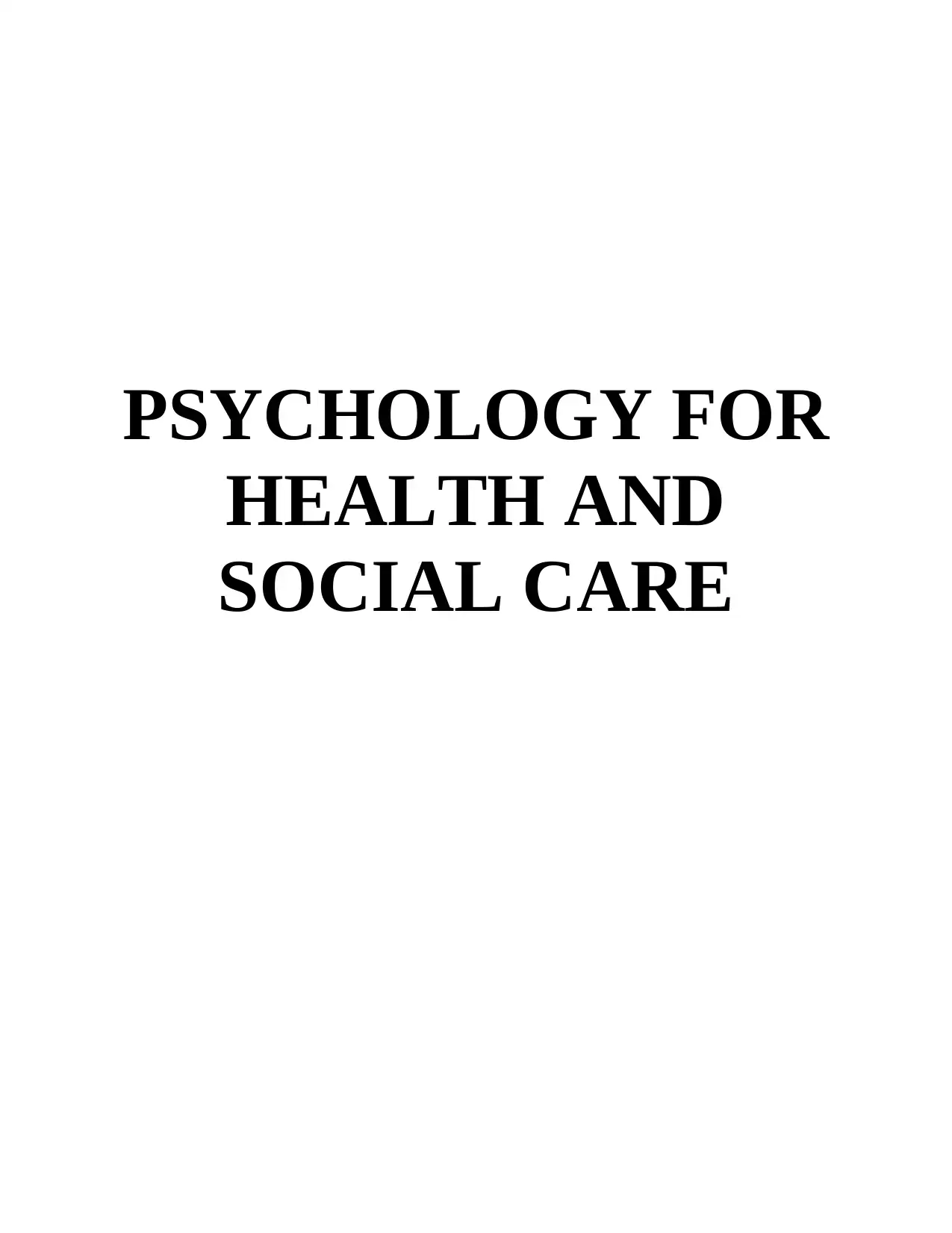
PSYCHOLOGY FOR
HEALTH AND
SOCIAL CARE
HEALTH AND
SOCIAL CARE
Paraphrase This Document
Need a fresh take? Get an instant paraphrase of this document with our AI Paraphraser
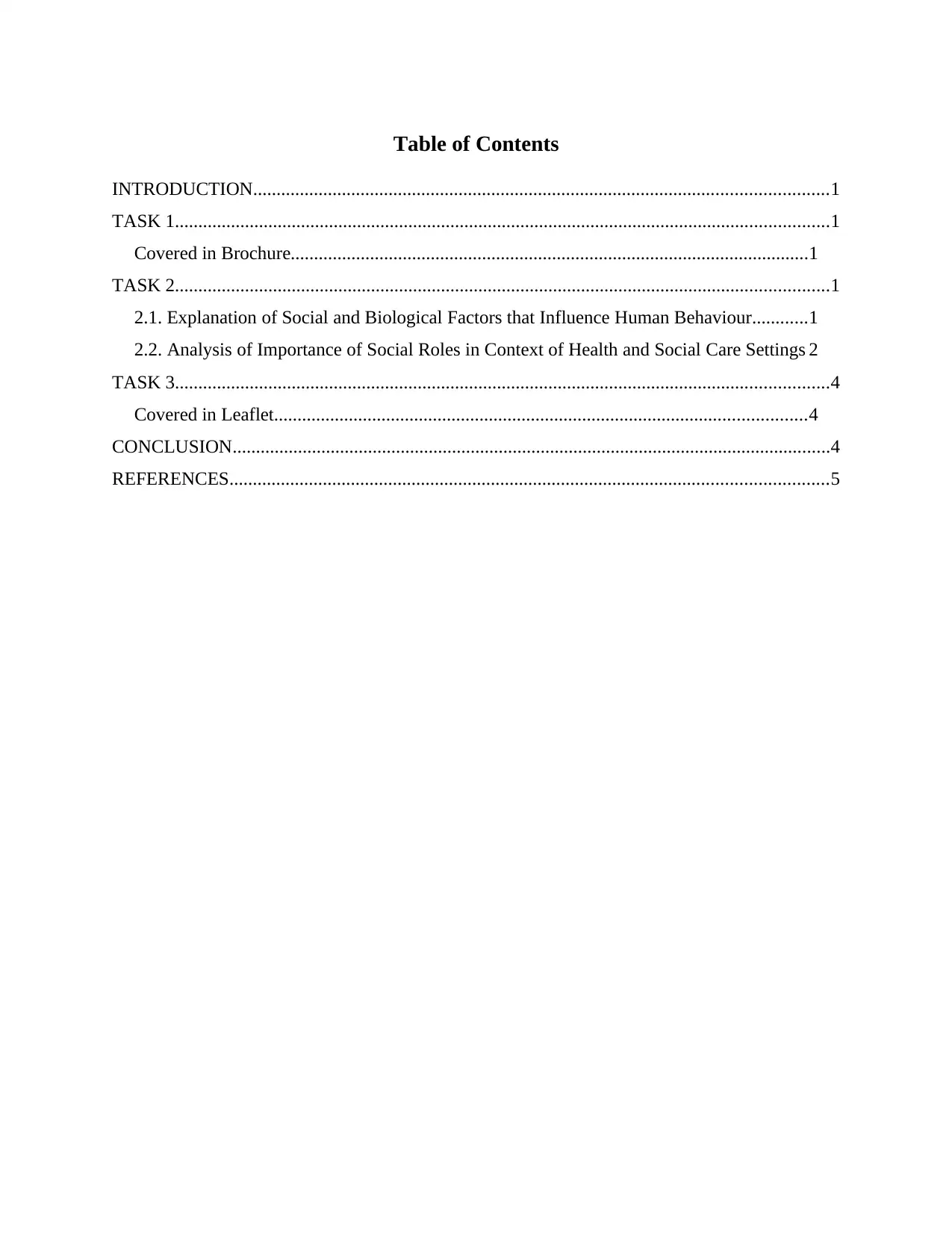
Table of Contents
INTRODUCTION...........................................................................................................................1
TASK 1............................................................................................................................................1
Covered in Brochure...............................................................................................................1
TASK 2............................................................................................................................................1
2.1. Explanation of Social and Biological Factors that Influence Human Behaviour............1
2.2. Analysis of Importance of Social Roles in Context of Health and Social Care Settings 2
TASK 3............................................................................................................................................4
Covered in Leaflet..................................................................................................................4
CONCLUSION................................................................................................................................4
REFERENCES................................................................................................................................5
INTRODUCTION...........................................................................................................................1
TASK 1............................................................................................................................................1
Covered in Brochure...............................................................................................................1
TASK 2............................................................................................................................................1
2.1. Explanation of Social and Biological Factors that Influence Human Behaviour............1
2.2. Analysis of Importance of Social Roles in Context of Health and Social Care Settings 2
TASK 3............................................................................................................................................4
Covered in Leaflet..................................................................................................................4
CONCLUSION................................................................................................................................4
REFERENCES................................................................................................................................5
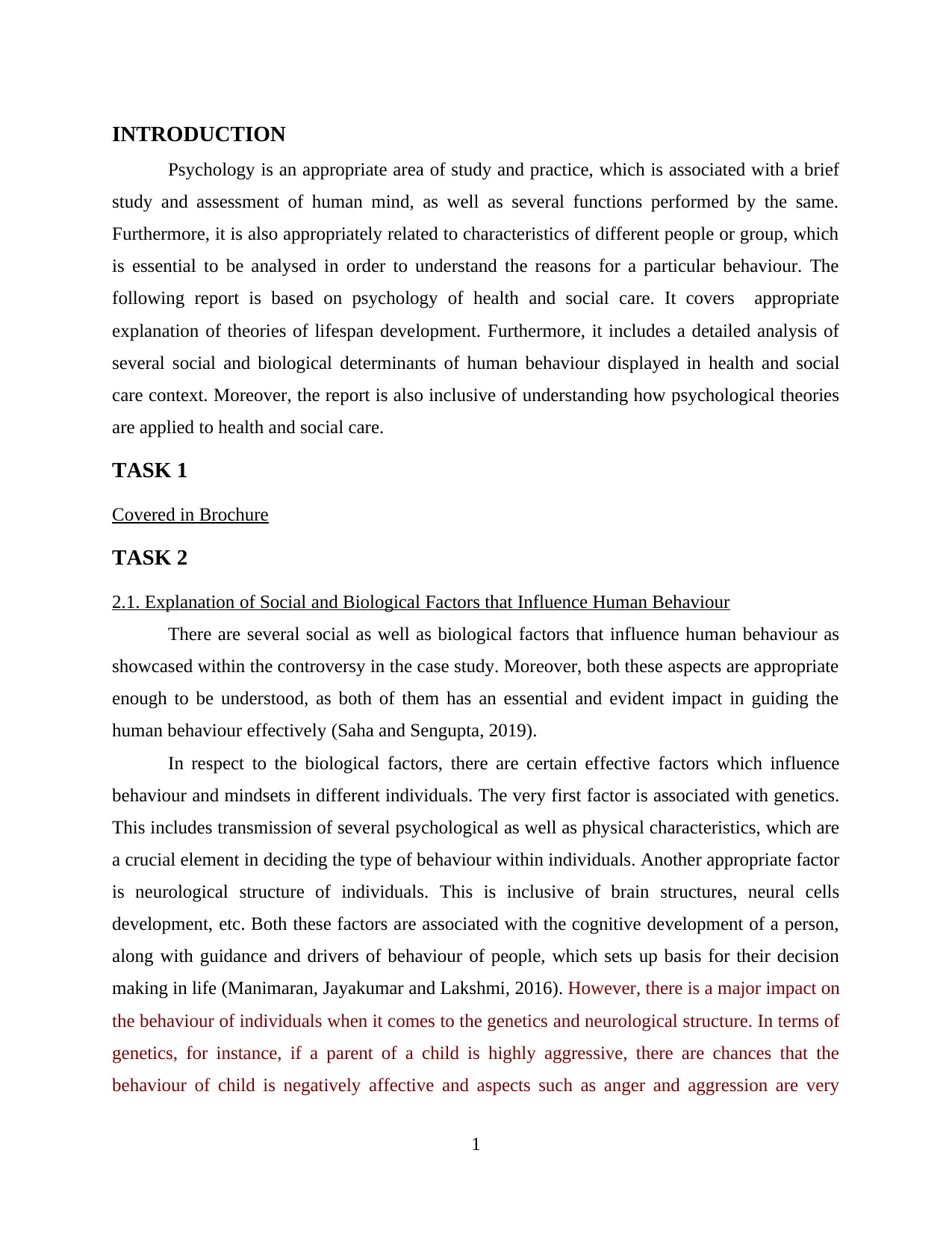
INTRODUCTION
Psychology is an appropriate area of study and practice, which is associated with a brief
study and assessment of human mind, as well as several functions performed by the same.
Furthermore, it is also appropriately related to characteristics of different people or group, which
is essential to be analysed in order to understand the reasons for a particular behaviour. The
following report is based on psychology of health and social care. It covers appropriate
explanation of theories of lifespan development. Furthermore, it includes a detailed analysis of
several social and biological determinants of human behaviour displayed in health and social
care context. Moreover, the report is also inclusive of understanding how psychological theories
are applied to health and social care.
TASK 1
Covered in Brochure
TASK 2
2.1. Explanation of Social and Biological Factors that Influence Human Behaviour
There are several social as well as biological factors that influence human behaviour as
showcased within the controversy in the case study. Moreover, both these aspects are appropriate
enough to be understood, as both of them has an essential and evident impact in guiding the
human behaviour effectively (Saha and Sengupta, 2019).
In respect to the biological factors, there are certain effective factors which influence
behaviour and mindsets in different individuals. The very first factor is associated with genetics.
This includes transmission of several psychological as well as physical characteristics, which are
a crucial element in deciding the type of behaviour within individuals. Another appropriate factor
is neurological structure of individuals. This is inclusive of brain structures, neural cells
development, etc. Both these factors are associated with the cognitive development of a person,
along with guidance and drivers of behaviour of people, which sets up basis for their decision
making in life (Manimaran, Jayakumar and Lakshmi, 2016). However, there is a major impact on
the behaviour of individuals when it comes to the genetics and neurological structure. In terms of
genetics, for instance, if a parent of a child is highly aggressive, there are chances that the
behaviour of child is negatively affective and aspects such as anger and aggression are very
1
Psychology is an appropriate area of study and practice, which is associated with a brief
study and assessment of human mind, as well as several functions performed by the same.
Furthermore, it is also appropriately related to characteristics of different people or group, which
is essential to be analysed in order to understand the reasons for a particular behaviour. The
following report is based on psychology of health and social care. It covers appropriate
explanation of theories of lifespan development. Furthermore, it includes a detailed analysis of
several social and biological determinants of human behaviour displayed in health and social
care context. Moreover, the report is also inclusive of understanding how psychological theories
are applied to health and social care.
TASK 1
Covered in Brochure
TASK 2
2.1. Explanation of Social and Biological Factors that Influence Human Behaviour
There are several social as well as biological factors that influence human behaviour as
showcased within the controversy in the case study. Moreover, both these aspects are appropriate
enough to be understood, as both of them has an essential and evident impact in guiding the
human behaviour effectively (Saha and Sengupta, 2019).
In respect to the biological factors, there are certain effective factors which influence
behaviour and mindsets in different individuals. The very first factor is associated with genetics.
This includes transmission of several psychological as well as physical characteristics, which are
a crucial element in deciding the type of behaviour within individuals. Another appropriate factor
is neurological structure of individuals. This is inclusive of brain structures, neural cells
development, etc. Both these factors are associated with the cognitive development of a person,
along with guidance and drivers of behaviour of people, which sets up basis for their decision
making in life (Manimaran, Jayakumar and Lakshmi, 2016). However, there is a major impact on
the behaviour of individuals when it comes to the genetics and neurological structure. In terms of
genetics, for instance, if a parent of a child is highly aggressive, there are chances that the
behaviour of child is negatively affective and aspects such as anger and aggression are very
1
⊘ This is a preview!⊘
Do you want full access?
Subscribe today to unlock all pages.

Trusted by 1+ million students worldwide
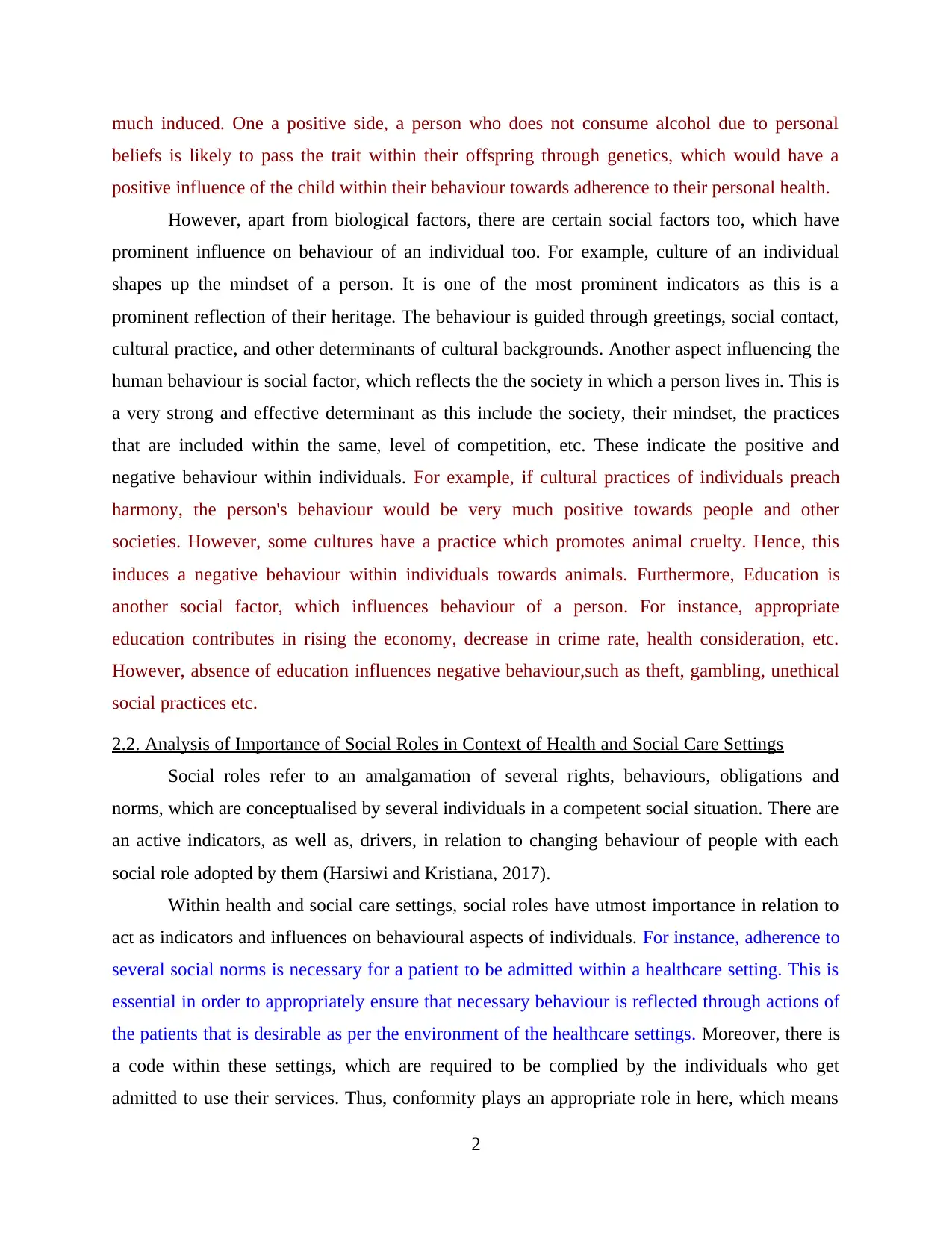
much induced. One a positive side, a person who does not consume alcohol due to personal
beliefs is likely to pass the trait within their offspring through genetics, which would have a
positive influence of the child within their behaviour towards adherence to their personal health.
However, apart from biological factors, there are certain social factors too, which have
prominent influence on behaviour of an individual too. For example, culture of an individual
shapes up the mindset of a person. It is one of the most prominent indicators as this is a
prominent reflection of their heritage. The behaviour is guided through greetings, social contact,
cultural practice, and other determinants of cultural backgrounds. Another aspect influencing the
human behaviour is social factor, which reflects the the society in which a person lives in. This is
a very strong and effective determinant as this include the society, their mindset, the practices
that are included within the same, level of competition, etc. These indicate the positive and
negative behaviour within individuals. For example, if cultural practices of individuals preach
harmony, the person's behaviour would be very much positive towards people and other
societies. However, some cultures have a practice which promotes animal cruelty. Hence, this
induces a negative behaviour within individuals towards animals. Furthermore, Education is
another social factor, which influences behaviour of a person. For instance, appropriate
education contributes in rising the economy, decrease in crime rate, health consideration, etc.
However, absence of education influences negative behaviour,such as theft, gambling, unethical
social practices etc.
2.2. Analysis of Importance of Social Roles in Context of Health and Social Care Settings
Social roles refer to an amalgamation of several rights, behaviours, obligations and
norms, which are conceptualised by several individuals in a competent social situation. There are
an active indicators, as well as, drivers, in relation to changing behaviour of people with each
social role adopted by them (Harsiwi and Kristiana, 2017).
Within health and social care settings, social roles have utmost importance in relation to
act as indicators and influences on behavioural aspects of individuals. For instance, adherence to
several social norms is necessary for a patient to be admitted within a healthcare setting. This is
essential in order to appropriately ensure that necessary behaviour is reflected through actions of
the patients that is desirable as per the environment of the healthcare settings. Moreover, there is
a code within these settings, which are required to be complied by the individuals who get
admitted to use their services. Thus, conformity plays an appropriate role in here, which means
2
beliefs is likely to pass the trait within their offspring through genetics, which would have a
positive influence of the child within their behaviour towards adherence to their personal health.
However, apart from biological factors, there are certain social factors too, which have
prominent influence on behaviour of an individual too. For example, culture of an individual
shapes up the mindset of a person. It is one of the most prominent indicators as this is a
prominent reflection of their heritage. The behaviour is guided through greetings, social contact,
cultural practice, and other determinants of cultural backgrounds. Another aspect influencing the
human behaviour is social factor, which reflects the the society in which a person lives in. This is
a very strong and effective determinant as this include the society, their mindset, the practices
that are included within the same, level of competition, etc. These indicate the positive and
negative behaviour within individuals. For example, if cultural practices of individuals preach
harmony, the person's behaviour would be very much positive towards people and other
societies. However, some cultures have a practice which promotes animal cruelty. Hence, this
induces a negative behaviour within individuals towards animals. Furthermore, Education is
another social factor, which influences behaviour of a person. For instance, appropriate
education contributes in rising the economy, decrease in crime rate, health consideration, etc.
However, absence of education influences negative behaviour,such as theft, gambling, unethical
social practices etc.
2.2. Analysis of Importance of Social Roles in Context of Health and Social Care Settings
Social roles refer to an amalgamation of several rights, behaviours, obligations and
norms, which are conceptualised by several individuals in a competent social situation. There are
an active indicators, as well as, drivers, in relation to changing behaviour of people with each
social role adopted by them (Harsiwi and Kristiana, 2017).
Within health and social care settings, social roles have utmost importance in relation to
act as indicators and influences on behavioural aspects of individuals. For instance, adherence to
several social norms is necessary for a patient to be admitted within a healthcare setting. This is
essential in order to appropriately ensure that necessary behaviour is reflected through actions of
the patients that is desirable as per the environment of the healthcare settings. Moreover, there is
a code within these settings, which are required to be complied by the individuals who get
admitted to use their services. Thus, conformity plays an appropriate role in here, which means
2
Paraphrase This Document
Need a fresh take? Get an instant paraphrase of this document with our AI Paraphraser
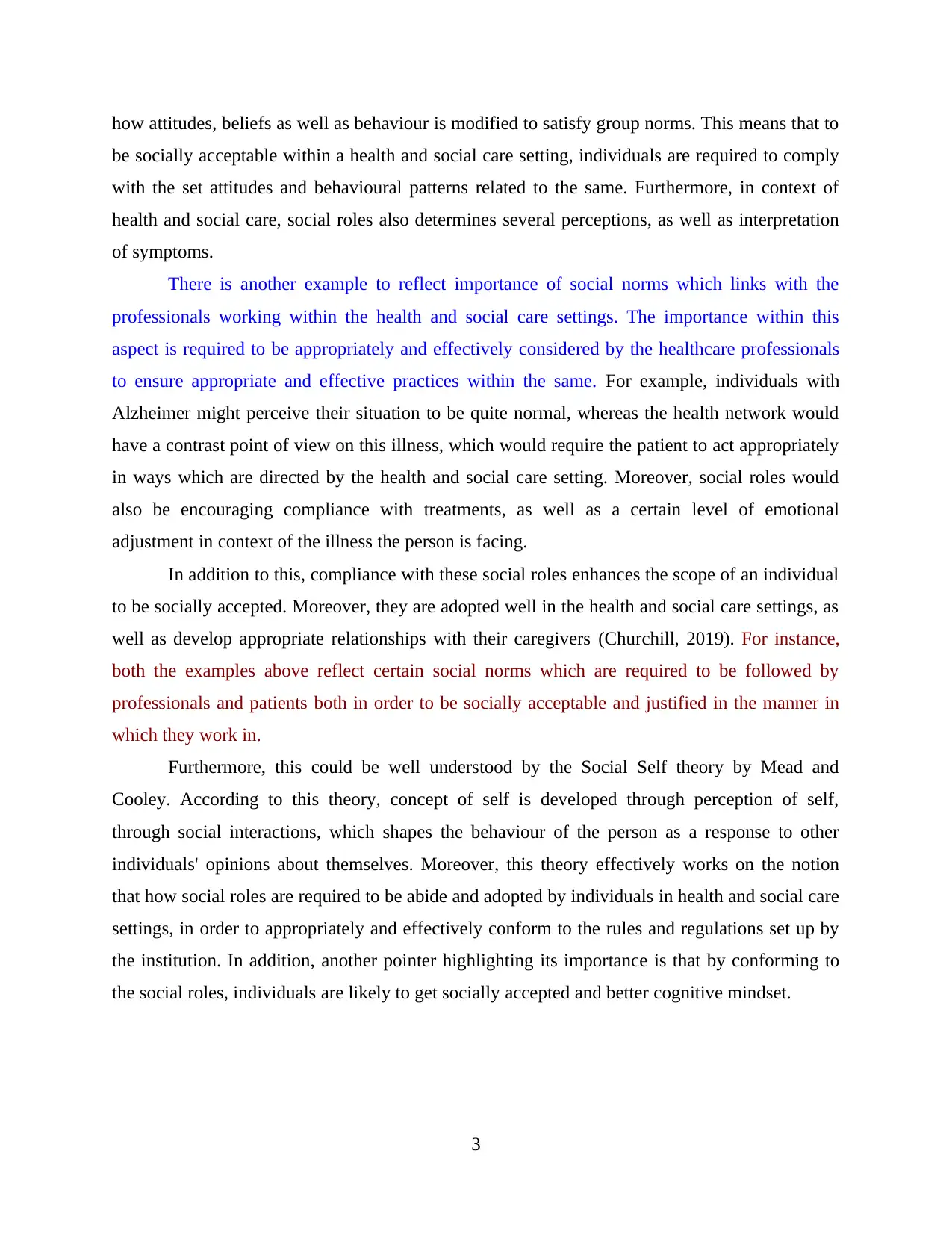
how attitudes, beliefs as well as behaviour is modified to satisfy group norms. This means that to
be socially acceptable within a health and social care setting, individuals are required to comply
with the set attitudes and behavioural patterns related to the same. Furthermore, in context of
health and social care, social roles also determines several perceptions, as well as interpretation
of symptoms.
There is another example to reflect importance of social norms which links with the
professionals working within the health and social care settings. The importance within this
aspect is required to be appropriately and effectively considered by the healthcare professionals
to ensure appropriate and effective practices within the same. For example, individuals with
Alzheimer might perceive their situation to be quite normal, whereas the health network would
have a contrast point of view on this illness, which would require the patient to act appropriately
in ways which are directed by the health and social care setting. Moreover, social roles would
also be encouraging compliance with treatments, as well as a certain level of emotional
adjustment in context of the illness the person is facing.
In addition to this, compliance with these social roles enhances the scope of an individual
to be socially accepted. Moreover, they are adopted well in the health and social care settings, as
well as develop appropriate relationships with their caregivers (Churchill, 2019). For instance,
both the examples above reflect certain social norms which are required to be followed by
professionals and patients both in order to be socially acceptable and justified in the manner in
which they work in.
Furthermore, this could be well understood by the Social Self theory by Mead and
Cooley. According to this theory, concept of self is developed through perception of self,
through social interactions, which shapes the behaviour of the person as a response to other
individuals' opinions about themselves. Moreover, this theory effectively works on the notion
that how social roles are required to be abide and adopted by individuals in health and social care
settings, in order to appropriately and effectively conform to the rules and regulations set up by
the institution. In addition, another pointer highlighting its importance is that by conforming to
the social roles, individuals are likely to get socially accepted and better cognitive mindset.
3
be socially acceptable within a health and social care setting, individuals are required to comply
with the set attitudes and behavioural patterns related to the same. Furthermore, in context of
health and social care, social roles also determines several perceptions, as well as interpretation
of symptoms.
There is another example to reflect importance of social norms which links with the
professionals working within the health and social care settings. The importance within this
aspect is required to be appropriately and effectively considered by the healthcare professionals
to ensure appropriate and effective practices within the same. For example, individuals with
Alzheimer might perceive their situation to be quite normal, whereas the health network would
have a contrast point of view on this illness, which would require the patient to act appropriately
in ways which are directed by the health and social care setting. Moreover, social roles would
also be encouraging compliance with treatments, as well as a certain level of emotional
adjustment in context of the illness the person is facing.
In addition to this, compliance with these social roles enhances the scope of an individual
to be socially accepted. Moreover, they are adopted well in the health and social care settings, as
well as develop appropriate relationships with their caregivers (Churchill, 2019). For instance,
both the examples above reflect certain social norms which are required to be followed by
professionals and patients both in order to be socially acceptable and justified in the manner in
which they work in.
Furthermore, this could be well understood by the Social Self theory by Mead and
Cooley. According to this theory, concept of self is developed through perception of self,
through social interactions, which shapes the behaviour of the person as a response to other
individuals' opinions about themselves. Moreover, this theory effectively works on the notion
that how social roles are required to be abide and adopted by individuals in health and social care
settings, in order to appropriately and effectively conform to the rules and regulations set up by
the institution. In addition, another pointer highlighting its importance is that by conforming to
the social roles, individuals are likely to get socially accepted and better cognitive mindset.
3
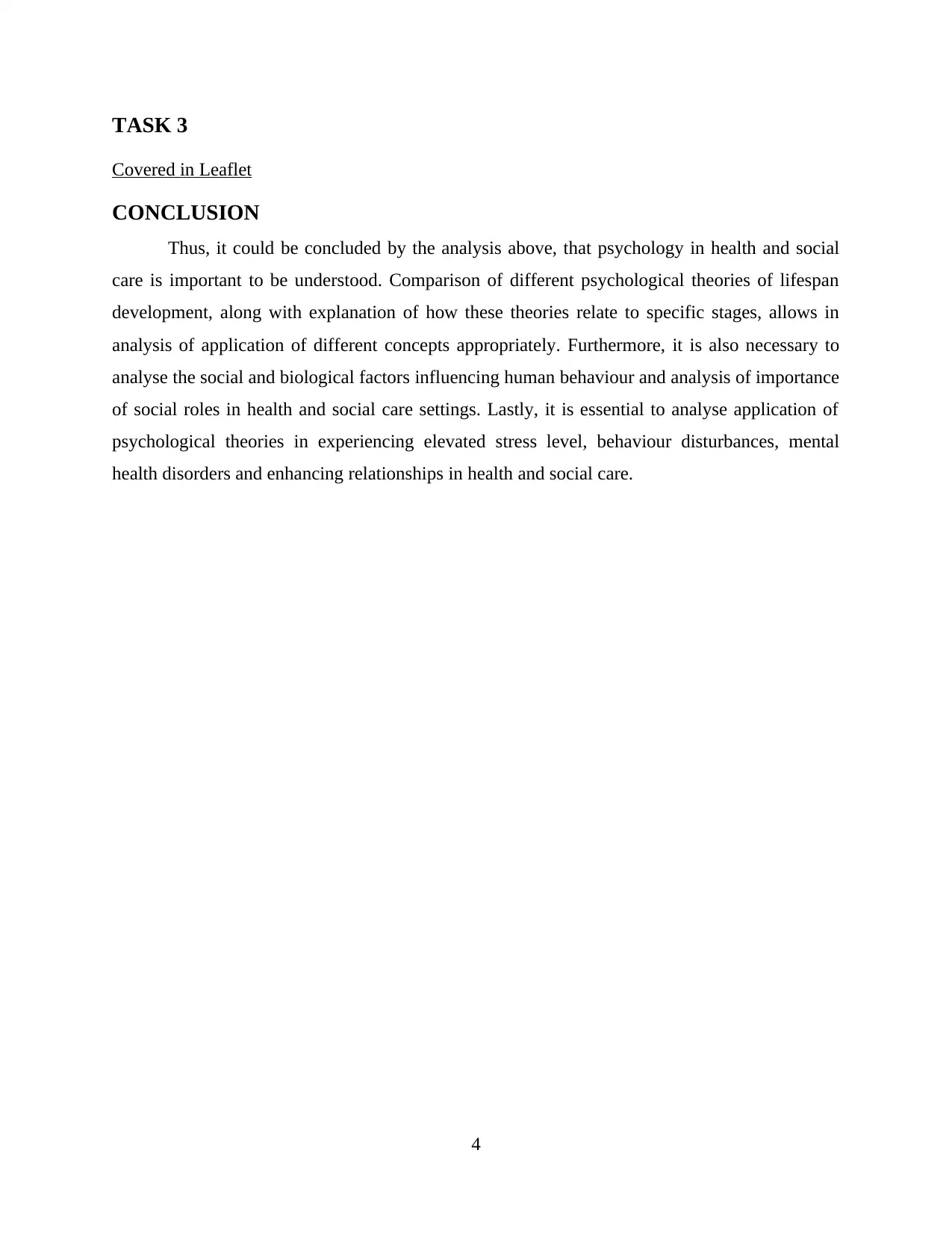
TASK 3
Covered in Leaflet
CONCLUSION
Thus, it could be concluded by the analysis above, that psychology in health and social
care is important to be understood. Comparison of different psychological theories of lifespan
development, along with explanation of how these theories relate to specific stages, allows in
analysis of application of different concepts appropriately. Furthermore, it is also necessary to
analyse the social and biological factors influencing human behaviour and analysis of importance
of social roles in health and social care settings. Lastly, it is essential to analyse application of
psychological theories in experiencing elevated stress level, behaviour disturbances, mental
health disorders and enhancing relationships in health and social care.
4
Covered in Leaflet
CONCLUSION
Thus, it could be concluded by the analysis above, that psychology in health and social
care is important to be understood. Comparison of different psychological theories of lifespan
development, along with explanation of how these theories relate to specific stages, allows in
analysis of application of different concepts appropriately. Furthermore, it is also necessary to
analyse the social and biological factors influencing human behaviour and analysis of importance
of social roles in health and social care settings. Lastly, it is essential to analyse application of
psychological theories in experiencing elevated stress level, behaviour disturbances, mental
health disorders and enhancing relationships in health and social care.
4
⊘ This is a preview!⊘
Do you want full access?
Subscribe today to unlock all pages.

Trusted by 1+ million students worldwide
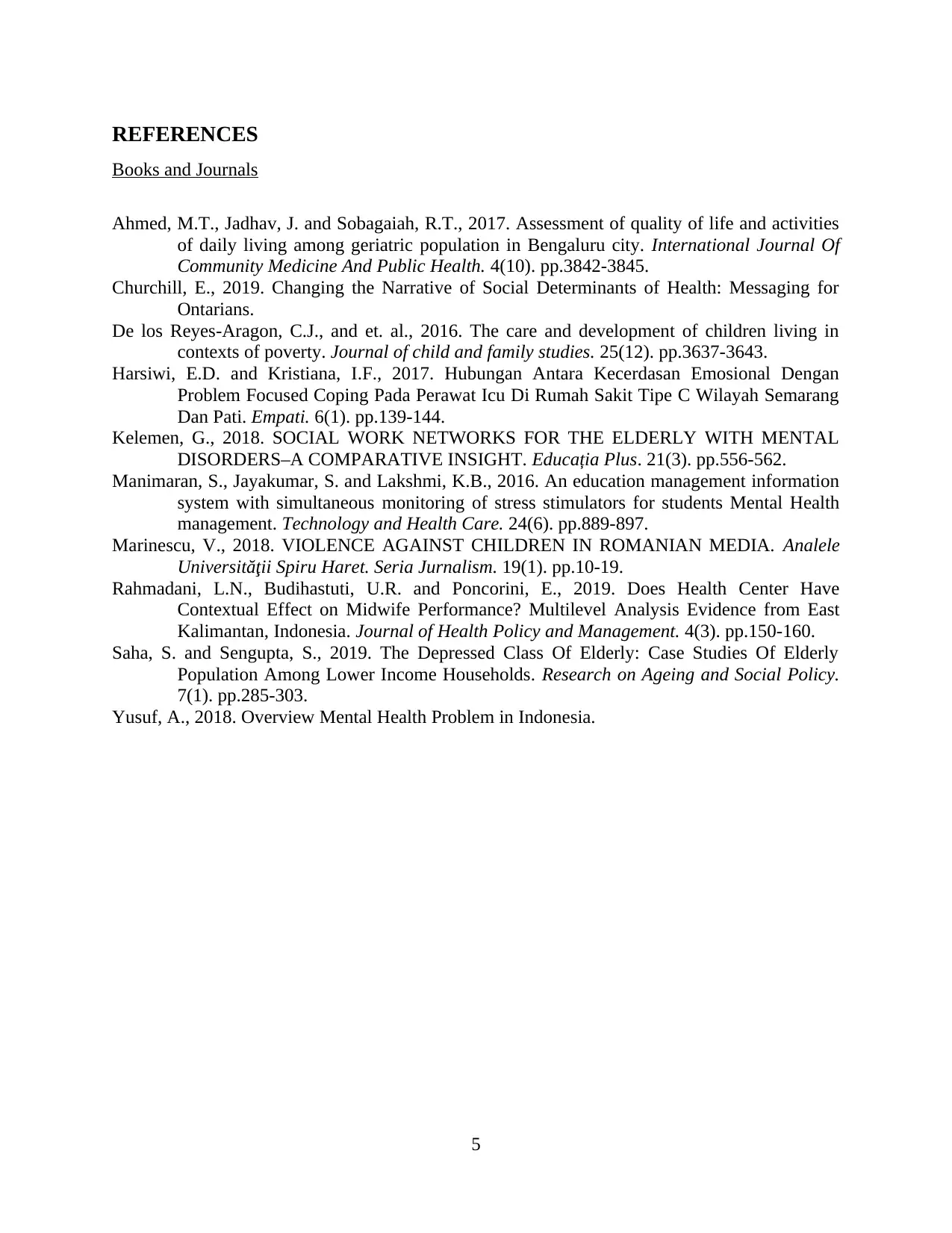
REFERENCES
Books and Journals
Ahmed, M.T., Jadhav, J. and Sobagaiah, R.T., 2017. Assessment of quality of life and activities
of daily living among geriatric population in Bengaluru city. International Journal Of
Community Medicine And Public Health. 4(10). pp.3842-3845.
Churchill, E., 2019. Changing the Narrative of Social Determinants of Health: Messaging for
Ontarians.
De los Reyes-Aragon, C.J., and et. al., 2016. The care and development of children living in
contexts of poverty. Journal of child and family studies. 25(12). pp.3637-3643.
Harsiwi, E.D. and Kristiana, I.F., 2017. Hubungan Antara Kecerdasan Emosional Dengan
Problem Focused Coping Pada Perawat Icu Di Rumah Sakit Tipe C Wilayah Semarang
Dan Pati. Empati. 6(1). pp.139-144.
Kelemen, G., 2018. SOCIAL WORK NETWORKS FOR THE ELDERLY WITH MENTAL
DISORDERS–A COMPARATIVE INSIGHT. Educația Plus. 21(3). pp.556-562.
Manimaran, S., Jayakumar, S. and Lakshmi, K.B., 2016. An education management information
system with simultaneous monitoring of stress stimulators for students Mental Health
management. Technology and Health Care. 24(6). pp.889-897.
Marinescu, V., 2018. VIOLENCE AGAINST CHILDREN IN ROMANIAN MEDIA. Analele
Universităţii Spiru Haret. Seria Jurnalism. 19(1). pp.10-19.
Rahmadani, L.N., Budihastuti, U.R. and Poncorini, E., 2019. Does Health Center Have
Contextual Effect on Midwife Performance? Multilevel Analysis Evidence from East
Kalimantan, Indonesia. Journal of Health Policy and Management. 4(3). pp.150-160.
Saha, S. and Sengupta, S., 2019. The Depressed Class Of Elderly: Case Studies Of Elderly
Population Among Lower Income Households. Research on Ageing and Social Policy.
7(1). pp.285-303.
Yusuf, A., 2018. Overview Mental Health Problem in Indonesia.
5
Books and Journals
Ahmed, M.T., Jadhav, J. and Sobagaiah, R.T., 2017. Assessment of quality of life and activities
of daily living among geriatric population in Bengaluru city. International Journal Of
Community Medicine And Public Health. 4(10). pp.3842-3845.
Churchill, E., 2019. Changing the Narrative of Social Determinants of Health: Messaging for
Ontarians.
De los Reyes-Aragon, C.J., and et. al., 2016. The care and development of children living in
contexts of poverty. Journal of child and family studies. 25(12). pp.3637-3643.
Harsiwi, E.D. and Kristiana, I.F., 2017. Hubungan Antara Kecerdasan Emosional Dengan
Problem Focused Coping Pada Perawat Icu Di Rumah Sakit Tipe C Wilayah Semarang
Dan Pati. Empati. 6(1). pp.139-144.
Kelemen, G., 2018. SOCIAL WORK NETWORKS FOR THE ELDERLY WITH MENTAL
DISORDERS–A COMPARATIVE INSIGHT. Educația Plus. 21(3). pp.556-562.
Manimaran, S., Jayakumar, S. and Lakshmi, K.B., 2016. An education management information
system with simultaneous monitoring of stress stimulators for students Mental Health
management. Technology and Health Care. 24(6). pp.889-897.
Marinescu, V., 2018. VIOLENCE AGAINST CHILDREN IN ROMANIAN MEDIA. Analele
Universităţii Spiru Haret. Seria Jurnalism. 19(1). pp.10-19.
Rahmadani, L.N., Budihastuti, U.R. and Poncorini, E., 2019. Does Health Center Have
Contextual Effect on Midwife Performance? Multilevel Analysis Evidence from East
Kalimantan, Indonesia. Journal of Health Policy and Management. 4(3). pp.150-160.
Saha, S. and Sengupta, S., 2019. The Depressed Class Of Elderly: Case Studies Of Elderly
Population Among Lower Income Households. Research on Ageing and Social Policy.
7(1). pp.285-303.
Yusuf, A., 2018. Overview Mental Health Problem in Indonesia.
5
1 out of 7
Related Documents
Your All-in-One AI-Powered Toolkit for Academic Success.
+13062052269
info@desklib.com
Available 24*7 on WhatsApp / Email
![[object Object]](/_next/static/media/star-bottom.7253800d.svg)
Unlock your academic potential
Copyright © 2020–2026 A2Z Services. All Rights Reserved. Developed and managed by ZUCOL.





